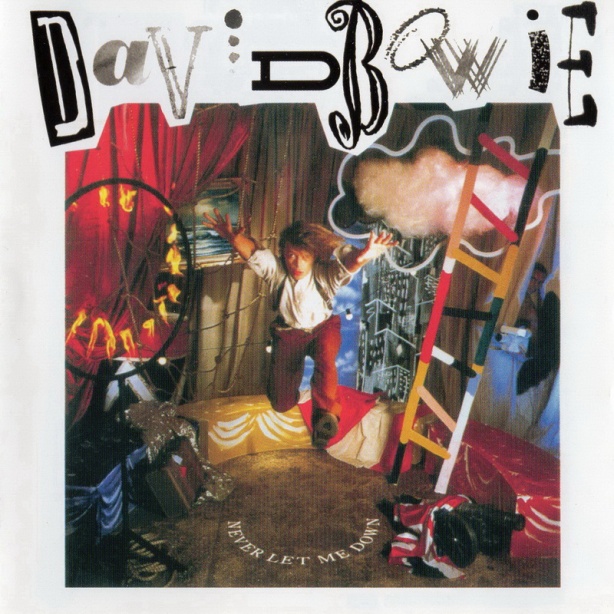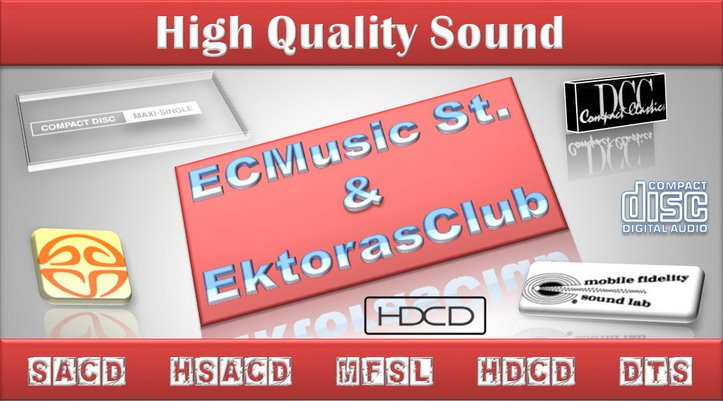
David Bowie - Never Let Me Down
Album Notes
David Bowie has claimed that Never Let Me Down is one of the worst albums of this career. He has claimed that he went into the studio for this album without really knowing why he was doing it, nor really caring that much about how it turned out. Indeed, the eventual realization that he was simply “going through the motions” on this project caused him to form Tin Machine, keep Tin Machine together much longer than he should have, and refrain from releasing another solo album until 1993’s Black Tie White Noise.
For all of this criticism, however, Never Let Me Down is not the worst Bowie album in existence. That award goes to Tonight, a truly generic project thrown together in 1984 on the heels of Let’s Dance. In comparison to this, Never Let Me Down is actually a step back in the right direction — a mediocre work by Bowie’s standards, to be sure, but not a complete disaster (the Glass Spider tour, of course, is something entirely different, and best forgotten by all concerned).
Moreover, there are actually a few decent songs on this project. “Time Will Crawl”, though falling a few a few notches below “classic” levels for Bowie, is at least a worthy successor to his earlier apocalyptic pieces, and has enough internal diversity to make it the best track on the album (it was also released as a single, but failed to make the Top 40 in America). The track begins with an eerie mixture of saxophone and keyboards, followed up with truly frightening lyrics which include references to both “Space Oddity” and possibly “The Supermen” as well. The sax solo and Floydean effects after the second chorus are nice touches as well.
The opening track is fairly good as well. “Day In, Day Out” (which did make the American top 40, somehow) commences with an ominous synth section, quickly followed by a heavy drum beat which remains consistent throughout the song (a Let’s Dance reference, perhaps). The use of brass, percussive devices, and piano adds a bit of extra flavour to the track as well. The song itself is a somewhat awkward attempt at addressing the increased levels of homelessness, though it maintains a certain level of credibility by personalizing the story through “Julie”, the heroine of the tale. The arrangement seems a bit of a mess at times, but the good parts are enough to merit a higher rating.
And then there’s “Glass Spider” itself, a would-be epic number with a bizarre, Edgar Allan Poe-esque spoken-word introduction regarding the beauty and terror of the titular beast. The eventual song which emerges from this is, unfortunately, not quite as good as it could have been — the guitar parts here are better than on the rest of the album, and the bass line has a certain simple charm … but that somehow isn’t enough. Bowie’s repeated “Mommy come back ’cause the water’s all gone” line gives a certain element of mystery to the track, but also suggests that he didn’t take the theme of the song too far beyond the original idea. This is probably the most ambitious track on the album, but it simply doesn’t go far as it should have.
The other tracks are either average or slightly below average. “Beat Of Your Drum” is an obvious weak moment on the album; beginning with a vaguely interesting story about voyeurism, it quickly develops into a tedious repetition of the title, and goes on for much longer than it should have. “Never Let Me Down” is a vaguely “classy” pop song, mingling love and religion in the time-honoured manner, and producing a decent piece of pop culture in the process. It’s a bit underdeveloped, though, the odd harmonica intrusion aside (this song also made the US Top 40, btw).
“Zeroes” sees Bowie trying to relive his past as a glam rocker, with bogus live chants heralding the on-stage presence of “The Zeroes”, a new Bowie-identity which was thankfully nipped fairly close to the bud. The music is fairly basic and doesn’t change through the song; the lyrics are utterly forgettable. A few steps above “bad”, it’s also quite a few notches below “meaningful in any conceivable manner”.
The tracks which round out the section of the album formerly known as “the end of Side Two” are, predictably, throwaways. “Shining Star (Makin’ My Love)” may actually be the best of the lot — a macabre story of inner-city drug use mingled with a bizarre mock-Broadway lyric and musical arrangement — but it’s nothing too special. “New York’s In Love” isn’t as bad as the title might suggest, but neither is it particularly notable for anything — a decently-performed rock song that could have used a bit more on the writing side. “’87 And Cry” is essentially in the same position — there simply isn’t anything terribly distinctive about these numbers.
“Too Dizzy” is another relative weak moment, despite the occasional odd lyric or saxophone part — aside from being lacking any notable qualities, it drags on for too long. “Bang Bang”, which ends the album, is a somewhat surprising turn back to a vaguely interesting direction – the guitar/bass/saxophone combination is fairly good, and the lyric receives an oddly threatening connotation in this context. As with some other tracks, though, it seems dashed off a bit too quickly.
It’s to Bowie’s credit that even his weaker albums are still listenable, but there is absolute no manner in which this work may be considered essential. The good material might make it worthwhile if you’re already an established fan — otherwise, though, there are much better Bowie albums to acquire. —Christopher Currie, All Tentative Reviews – tranglos.com”
David Bowie has claimed that Never Let Me Down is one of the worst albums of this career. He has claimed that he went into the studio for this album without really knowing why he was doing it, nor really caring that much about how it turned out. Indeed, the eventual realization that he was simply “going through the motions” on this project caused him to form Tin Machine, keep Tin Machine together much longer than he should have, and refrain from releasing another solo album until 1993’s Black Tie White Noise.
For all of this criticism, however, Never Let Me Down is not the worst Bowie album in existence. That award goes to Tonight, a truly generic project thrown together in 1984 on the heels of Let’s Dance. In comparison to this, Never Let Me Down is actually a step back in the right direction — a mediocre work by Bowie’s standards, to be sure, but not a complete disaster (the Glass Spider tour, of course, is something entirely different, and best forgotten by all concerned).
Moreover, there are actually a few decent songs on this project. “Time Will Crawl”, though falling a few a few notches below “classic” levels for Bowie, is at least a worthy successor to his earlier apocalyptic pieces, and has enough internal diversity to make it the best track on the album (it was also released as a single, but failed to make the Top 40 in America). The track begins with an eerie mixture of saxophone and keyboards, followed up with truly frightening lyrics which include references to both “Space Oddity” and possibly “The Supermen” as well. The sax solo and Floydean effects after the second chorus are nice touches as well.
The opening track is fairly good as well. “Day In, Day Out” (which did make the American top 40, somehow) commences with an ominous synth section, quickly followed by a heavy drum beat which remains consistent throughout the song (a Let’s Dance reference, perhaps). The use of brass, percussive devices, and piano adds a bit of extra flavour to the track as well. The song itself is a somewhat awkward attempt at addressing the increased levels of homelessness, though it maintains a certain level of credibility by personalizing the story through “Julie”, the heroine of the tale. The arrangement seems a bit of a mess at times, but the good parts are enough to merit a higher rating.
And then there’s “Glass Spider” itself, a would-be epic number with a bizarre, Edgar Allan Poe-esque spoken-word introduction regarding the beauty and terror of the titular beast. The eventual song which emerges from this is, unfortunately, not quite as good as it could have been — the guitar parts here are better than on the rest of the album, and the bass line has a certain simple charm … but that somehow isn’t enough. Bowie’s repeated “Mommy come back ’cause the water’s all gone” line gives a certain element of mystery to the track, but also suggests that he didn’t take the theme of the song too far beyond the original idea. This is probably the most ambitious track on the album, but it simply doesn’t go far as it should have.
The other tracks are either average or slightly below average. “Beat Of Your Drum” is an obvious weak moment on the album; beginning with a vaguely interesting story about voyeurism, it quickly develops into a tedious repetition of the title, and goes on for much longer than it should have. “Never Let Me Down” is a vaguely “classy” pop song, mingling love and religion in the time-honoured manner, and producing a decent piece of pop culture in the process. It’s a bit underdeveloped, though, the odd harmonica intrusion aside (this song also made the US Top 40, btw).
“Zeroes” sees Bowie trying to relive his past as a glam rocker, with bogus live chants heralding the on-stage presence of “The Zeroes”, a new Bowie-identity which was thankfully nipped fairly close to the bud. The music is fairly basic and doesn’t change through the song; the lyrics are utterly forgettable. A few steps above “bad”, it’s also quite a few notches below “meaningful in any conceivable manner”.
The tracks which round out the section of the album formerly known as “the end of Side Two” are, predictably, throwaways. “Shining Star (Makin’ My Love)” may actually be the best of the lot — a macabre story of inner-city drug use mingled with a bizarre mock-Broadway lyric and musical arrangement — but it’s nothing too special. “New York’s In Love” isn’t as bad as the title might suggest, but neither is it particularly notable for anything — a decently-performed rock song that could have used a bit more on the writing side. “’87 And Cry” is essentially in the same position — there simply isn’t anything terribly distinctive about these numbers.
“Too Dizzy” is another relative weak moment, despite the occasional odd lyric or saxophone part — aside from being lacking any notable qualities, it drags on for too long. “Bang Bang”, which ends the album, is a somewhat surprising turn back to a vaguely interesting direction – the guitar/bass/saxophone combination is fairly good, and the lyric receives an oddly threatening connotation in this context. As with some other tracks, though, it seems dashed off a bit too quickly.
It’s to Bowie’s credit that even his weaker albums are still listenable, but there is absolute no manner in which this work may be considered essential. The good material might make it worthwhile if you’re already an established fan — otherwise, though, there are much better Bowie albums to acquire. —Christopher Currie, All Tentative Reviews – tranglos.com”
| EC0942 | David Bowie – Never Let Me Down |
| Label: | Disky |
| Catalog#: | VI 795622 |
| Format: | CD |
| Made in: | Netherlands |
| Released: | Disky 2002 | First Release 1987 |
| Barcode: | 0 724357 956222 |
| Style: | Pop/Rock, Rock |
David Bowie - Never Let Me Down
============================================================================
01 – Day-In Day-Out
02 – Time Will Crawl
03 – Beat Of Your Drum
04 – Never Let Me Down
05 – Zeroes
06 – Glass Spider
07 – Shining Star (Makin’ My Love)
08 – New York’s In Love
09 – ’87 And Cry
10 – Bang Bang
Total Time: 00:48:44
Credits ▼
- Alto Saxophone – Stan Harrison
- Artwork By [Art, Set], Design – Mick Haggerty
- Backing Vocals – Carlos Alomar, David Bowie, Diva Gray, Erdal Kizilcay, Gordon Grodie, Loni Groves, Robin Clark
- Baritone Saxophone – Steve Elson
- Bass – Carmine Rojas, Erdal Kizilcay
- Drums – Erdal Kizilcay
- Engineer [Assistant] – Andre Gauchat, Jon Goldberger, Justin Shirley Smith
- Flugelhorn – Earl Gardner
- Guitar – Carlos Alomar, David Bowie
- Keyboards – David Bowie, Erdal Kizilcay
- Lead Guitar – Peter Frampton
- Mastered By – Bob Ludwig
- Mellotron, Synthesizer [Moog], Harmonica – David Bowie
- Mixed By – Bob Clearmountain
- Mixed By [Assisted By] – David Richards
- Other [Set Constructions] – Ron Oates
- Percussion – Crusher Bennett
- Photography – Greg Gorman
- Piano – Philippe Saisse
- Producer – David Bowie, David Richards
- Recorded By [Additional] – Malcolm Pollack
- Synthesizer [Guitar Synthesizer] – Carlos Alomar
- Tambourine – Carlos Alomar, David Bowie
- Tenor Saxophone – Lenny Pickett
- Trumpet – Earl Gardner, Erdal Kizilcay, Laurie Frink
- Written-By – Bowie
Notes▼
℗+© 1987 David Bowie.
The copyright in this recording is owned by David Bowie and licensed exclusively to Virgin Records Ltd.
This label copy information is the subject of copyright protection.
All rights reserved. © 1995 Virgin Records Ltd.
Licensed to Disky Communications Europe B.V. by EMI Records Ltd.
Marketed and Distributed in 2002 by Disky Communications Europe B.V.
Printed in EU. Re-cover Design: Graphicind.NL.
Made in Netherlands
Barcode and Other Identifiers ▼
Barcode (Text): 0 724357 956222
Mastering SID Code: IFPI LP02
Rights Society: BIEM / STEMRA
Label Code: LC 11955
Other (Distribution Code): GV R30903








No comments:
Post a Comment